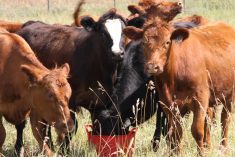OLDS, Alta. – A message straight from the hearts of 30 Canadian college students has been delivered to the United States Department of Agriculture pleading the case for resumed livestock trade since BSE closed borders nearly a year ago.
The impacts of BSE are embedded in the lives of many students at Olds College who admit that until last May 20, they knew almost nothing about this disease that has torn apart their personal lives. They understood the basic science of the condition but hadn’t learned about the devastating political and economic implications when a foreign animal disease isolates a nation from world trade.
Read Also

The Western Producer Livestock Report – November 6, 2025
Western Producer Livestock Report for November 6, 2025. See U.S. & Canadian hog prices, Canadian bison & lamb market data and sales insights.
A 22 minute video, along with written comments and personal impact statements developed through the Olds College business development department were submitted to the USDA April 2.
The U.S. comment period on new import rules on minimal-risk BSE countries ended April 7. These comments will be analyzed before the American government posts the final rules for resuming trade.
The students, all under age 25, talk about the consequences on their lives as farmers and students at an agricultural college.
They represent families involved in all sectors of the cattle business from seedstock to feedlot.
Others raise horses, goats, dairy or come from mixed farms or agribusinesses. Each wonders how to pay their future tuition fees, student loans and what kind of job they might find when trade resumes.
They talk of families leaving, people shooting cows rather than calling a veterinarian, lost opportunities and mounting debt.
For example, Cody LaRocque of Stony Plain, Alta., bought a pen of feeder cattle to pay tuition and get into the feedlot business. He sold them March 31.
“I’ve lost close to $13,000 on them,” he said in the video. “Now I’ve got that debt on top of my school.”
Sarah During of Westlock, Alta., owns purebred cattle with her family and depended on bull sales to cover her school expenses.
“I’m going to turn 20 and if the border doesn’t open by fall I’m going to go bankrupt and not be able to finish my schooling and end up in a dead-end job,” she said.
“I don’t think anybody was ready for this.”
She fears for the future of Canadian agriculture.
“We’re the generation who is taking the place of the older farmers that are there and getting out of the business. There is no decrease in inputs. So, we’re not going to make it,” she said.
Cody Lee Boulton from Okotoks, Alta., works part time at the Olds Ford dealership and has watched business decline.
“The sales volume is down and they are cutting back hours for employees. The whole community of Olds is agriculturally based,” she said.
Danielle Synder of Walkerton, Ont., comes from a mixed farm. Her father also owns a John Deere dealership where business is down and local farmers are suffering.
“They’re just buying what they need because they still have to provide the same care for their animals,” she said.
Bob Lockwood, dean of Olds College’s agricultural production, business and animal science department, said enrolment for 2004 classes is down, although applications are up for other classes unrelated to livestock studies.
Tuition is $3,600 for the year, but the added expenses of rent, books and sundries totals about $10,000 or more for the average student.
In addition, the college maintains a 120-cow herd for research and student study. A small feedlot handles custom and college-owned calves. For the first time, the beef program ran a deficit this year.















